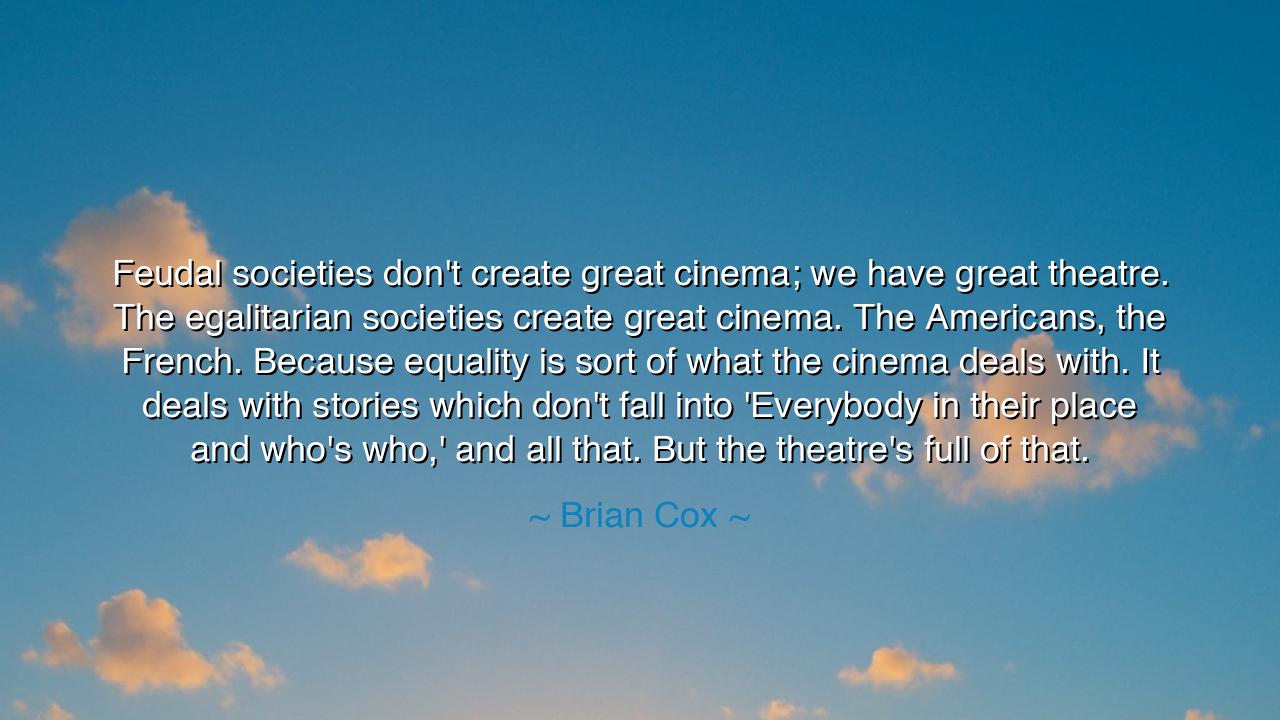
Feudal societies don't create great cinema; we have great
Feudal societies don't create great cinema; we have great theatre. The egalitarian societies create great cinema. The Americans, the French. Because equality is sort of what the cinema deals with. It deals with stories which don't fall into 'Everybody in their place and who's who,' and all that. But the theatre's full of that.






The words of Brian Cox, “Feudal societies don’t create great cinema; we have great theatre. The egalitarian societies create great cinema. The Americans, the French. Because equality is sort of what the cinema deals with. It deals with stories which don’t fall into ‘Everybody in their place and who’s who,’ and all that. But the theatre’s full of that,” are not merely an observation about art — they are a reflection on civilization itself. Beneath his statement lies a profound truth: that art mirrors the soul of society, and the kind of stories a culture tells reveal the structure of its heart. Cox, an actor of immense depth and experience, speaks not as a critic of feudalism alone, but as a philosopher tracing the lifeblood of freedom through the arteries of art.
In ancient terms, cinema and theatre represent two visions of the world — one bound by hierarchy, the other freed by equality. The theatre, as Cox says, was born in societies where roles were fixed, where men and women knew their place, and where the great dramas unfolded in palaces, temples, or courts — the stage of kings, gods, and nobles. It was the art of structure, of tradition, of destiny written before the first line was spoken. But cinema, emerging in the democratic age, became the art of the common soul. It spoke of the farmer, the worker, the dreamer, the lonely child. It was an art born of egalitarianism, and its heart beats with the rhythm of freedom. Cox’s words remind us that when equality spreads through a people, their art begins to tell the stories of all — not just of those who rule.
To understand his vision, we might look to history. In feudal Japan, Noh theatre reigned supreme — exquisite, ritualistic, and profound, but reserved for the elite, performed before emperors and shoguns. Its movements were bound by centuries of form. Contrast this with post-war Japanese cinema — Kurosawa, Ozu, and Mizoguchi — where peasants, farmers, and samurai alike shared the screen, their destinies intertwined by fate and choice alike. Here was equality rendered in light and shadow: the powerful and the powerless, each given their own humanity. Cox’s observation holds true — cinema flourishes where the boundaries between high and low dissolve, where the story of one becomes the story of all.
The same could be said of the Americans and the French, whom Cox invokes by name. American cinema rose from a land that, at least in spirit, believed in possibility — in the idea that anyone might become anything. From the cowboys of the western frontier to the jazz musicians of Harlem, American film gave voice to the wanderer and the outcast. French cinema, shaped by revolution and philosophy, embraced freedom of thought, confronting love, politics, and morality with fearless candor. Both traditions stand as monuments to equality of expression — each a rebellion against the rigid hierarchies of the old world.
Cox’s remark also carries a deeper warning: that feudal thinking can still exist even in free societies, and when it does, art begins to decay. Whenever storytellers are silenced, or when certain voices are deemed unworthy of the stage or screen, the creative spirit withers. The ancients knew this too. When Plato sought to exile the poets from his Republic, fearing their power to disrupt order, he revealed a truth he did not intend — that art thrives not under control, but under freedom. For cinema, as Cox says, “deals with stories which don’t fall into ‘everybody in their place,’” and when that freedom dies, so does the heartbeat of art.
And yet, his reflection is not a dismissal of theatre, but an acknowledgment of its lineage. Theatre was born in temples and courts, shaped by reverence and ritual. It is the art of the gods and of destiny. But cinema, the child of electricity and democracy, is the art of humanity — fluid, shared, universal. It belongs to no class and no order. It invites the viewer not to bow before its characters, but to walk beside them. In this way, cinema becomes a form of moral democracy, teaching empathy through the eyes of many lives.
Let this, then, be the lesson of Brian Cox’s words: that when a society becomes more equal, its art becomes more truthful. To create truly great cinema — or any art — one must listen to every voice, not just the loudest. One must break the old hierarchies of “who’s who,” and seek stories in the streets, the fields, and the forgotten corners of the human heart. For art, like justice, cannot flourish in a world where men are divided by birth or title. The ancients would have said that freedom is the breath of the soul — and when art breathes freely, so does civilization.
Thus, Cox’s reflection is not only about film; it is about humanity’s ascent from structure to spirit. When we abandon the idea that anyone has a fixed place, we begin to see that every life is a story worthy of being told. And when art reflects that truth, we come closer to understanding the divine equality that binds us all — the great, unending theatre of existence where each soul, whether noble or nameless, has its moment upon the stage.






AAdministratorAdministrator
Welcome, honored guests. Please leave a comment, we will respond soon